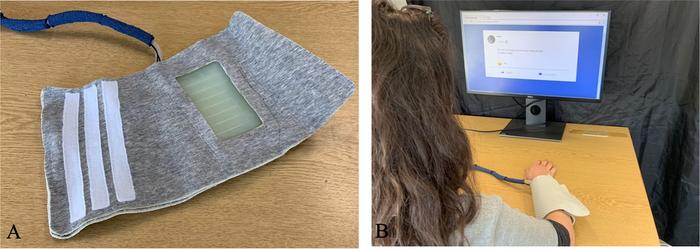Including “tactile emoticons” into social media communications can enhance communication, according to a study published June 12, 2024 in the open-access journal PLOS ONE by Alkistis Saramandi and Yee Ki Au from University College London, United Kingdom, and colleagues.

Credit: Saramandi et al., 2024, PLOS ONE, CC-BY 4.0 (
Including “tactile emoticons” into social media communications can enhance communication, according to a study published June 12, 2024 in the open-access journal PLOS ONE by Alkistis Saramandi and Yee Ki Au from University College London, United Kingdom, and colleagues.
Digital communications rely exclusively on visual and auditory cues (text, emoticons, videos, and music) to convey tone and emotion. Currently lacking from these platforms is touch, which can convey feelings of love and support, impact emotions, and influence behaviors. Technology companies are developing devices to incorporate touch into digital interactions, such as interactive kiss and hug transmission devices. These social touch devices can elicit feelings of closeness and positive emotions, but the effect of touch in social media communication is not well studied.
In this study, researchers incorporated tactile emoticons into social media interactions. Using a mock social media platform, participants were given posts to send that expressed either positive or negative emotions. They then received feedback via visual emoticons (e.g., a heart or thumbs up), tactile emoticons (a stroke on the forearm by either another person or a robotic device), or both.
Participants felt greater feelings of support and approval when they received the tactile emoticons compared to the visual-only feedback. This suggests that social touch, even by a stranger, can convey meaning without any other accompanying communication. Feedback consisting of both visual and tactile emoticons was preferred over either type of emoticon alone. The researchers noted that touch could offer additional context to visual emoticons, which can be misinterpreted. They also found that the type of touch matters. Touch delivered at a speed that activates the C-Tactile nervous system, which produces positive emotions associated with touching or embracing, was experienced more favorably than other types of touch.
According to the authors, this is the first study to explore the role of touch in communicating emotions via social media. They hope that the results can inform the development of devices to deliver touch during digital communications.
The authors add: “Touch has long been essential to human bonding and survival, yet in our digitized world we are more isolated and touch-deprived than ever. What if we could use ‘digitalized touch’ to bring us closer in communicating emotions in today’s world?”
#####
In your coverage please use this URL to provide access to the freely available article in PLOS ONE:
Citation: Saramandi A, Au YK, Koukoutsakis A, Zheng CY, Godwin A, Bianchi-Berthouze N, et al. (2024) Tactile emoticons: Conveying social emotions and intentions with manual and robotic tactile feedback during social media communications. PLoS ONE 19(6): e0304417.
Author Countries: UK, Sweden, Australia
Funding: This work was undertaken with funding from the UCL Social Science+ award (to CJ, NB and AF; https://www.ucl.ac.uk/research/domains/collaborative-social-science/research/social-science-plus), and in part with funding from the European Research Council (ERC) Starting Grant ERC-2012-STG GA313755 (to AF; https://erc.europa.eu/apply-grant/starting-grant), and the European Union’s Horizon 2020 research and innovation programme under grant agreement No. 818070, for the Consolidator Award METABODY (to AF; https://erc.europa.eu/apply-grant/consolidator-grant). The funders had no role in study design, data collection and analysis, decision to publish, or preparation of the manuscript.
Journal
PLoS ONE
Method of Research
Experimental study
Subject of Research
People
Article Title
Tactile emoticons: Conveying social emotions and intentions with manual and robotic tactile feedback during social media communications
Article Publication Date
12-Jun-2024
COI Statement
The authors have declared that no competing interests exist.



